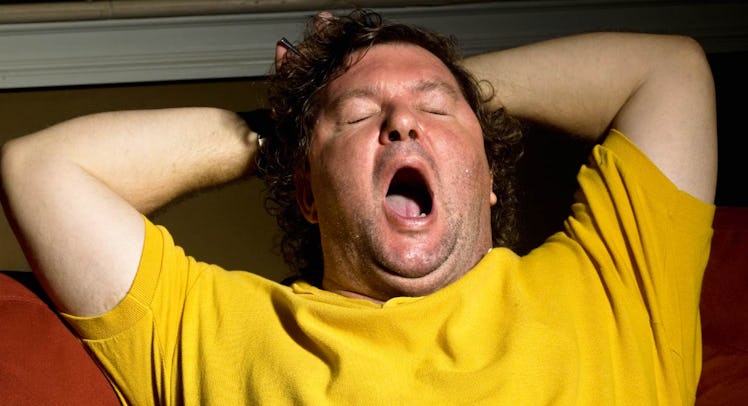Looking Tired Could Be Hurting Your Social Life
Scientists prove that no one wants to hang out with people who seem exhausted.

Plodding through the day visibly exhausted may not be a boon for your social life, according to a new study in Open Science. Researchers found that men and women who slept fewer than four hours per night for two consecutive nights were perceived as less attractive by their peers—and that fewer people wanted to spend time with them, based solely on photographs of their droopy lids.
“Someone who looked very sleepy or very unhealthy, regardless of sleep history, was considered much less socially appealing than someone who looked very alert or very healthy,” coauthor Tina Sundelin of the Karolinska Institute in Stockholm told Fatherly. “The indication of the study is that yes, it could have a negative effect on their social life, in terms of how others perceive them.”
For the study, Sundelin and colleagues snapped photos of 25 men and women after two nights of normal sleep, and then took another set of photos after two nights of barely any sleep—mimicking an experience new parents know well (except, perhaps, for those two nights of regular sleep). They then asked 122 volunteers to rate each photo for attractiveness, health, and trustworthiness and to comment on how likely they were to socialize with the person in each photograph.
Royal Society Open Science | Relationship between willingness to socialize and perceived sleepiness (a), health (b), attractiveness (c) and trustworthiness (d). The dots are based on raw data, with each dot representing one rating. Jitter was applied to better illustrate the distribution of the ratings.
The results broadly suggest that people may be less likely to socialize with individuals who look tired, and that they tend to consider them less attractive and less healthy (but, interestingly, no less trustworthy). Sundelin cautions, however, that the findings are far from definitive. “The extent of that effect in a real-life situation would also be affected by several other factors,” she told Fatherly. “The raters in this study only had still facial photographs to go by. In an actual interaction people may, for example, smile or they may yawn, making the effects smaller or larger, respectively.”
Still, we do tend to avoid people who look sickly or exhausted. Sundelin has a few theories as to why that might be. “Evolutionarily it makes sense to stay away from other people who may be contagious, so if someone looks unhealthy we would do better if we learnt to avoid that person,” she says. “But we may also have learned, growing up, that people who look sleepy are not the greatest company.”
Perhaps that’s not such a bad thing. When you roll into work with bags under your eyes and an espresso in each hand, after spending the night in a rocking chair with a howling infant, maybe you’d rather your coworkers just left you alone to relax.
“This in turn may actually benefit the sleepy person,” Sundelin says. “They might be left alone to get some much-needed rest!”